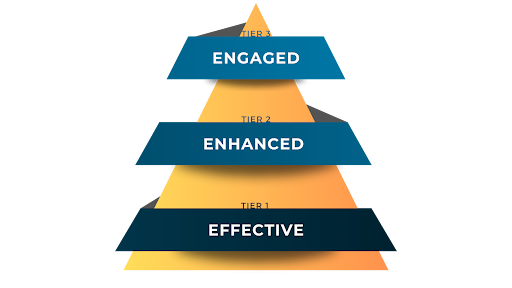
If you’ve looked into solar or been part of a solar presentation before, you know firsthand that warranties are a huge part of the conversation. And why shouldn’t it be? Investing in a solar system for your home can be one of the larger purchases a homeowner will make, so it only makes sense to know what kind of protection you’ll be getting.
When it comes to levels of protection and what is needed, there are plenty of options… and just as many gray areas. Solar equipment comes with a manufacturer warranty, and solar providers often give a “workmanship” warranty. There’s also home insurance, but wouldn’t that cover the same things as the manufacturer’s warranty? What about independent warranties like those from TPO (third-party ownership, i.e., leases) and insurance-backed warranties like Solar Insure that come into play?
Given all the noise, we’ve broken down coverage types into three tiers. Following the tier model can help drive conversations with homeowners to determine what coverage is right for them by explaining the type of businesses that operate at each tier, and providing a practical “scorecard” to guide you.
Table of Contents
Effective Level

The first tier of the warranty pyramid is the effective level, also known as tactical coverage. At this level, the warranties are generally the standard manufacturer warranties and minimum required workmanship warranties.
Solar panel manufacturers typically give 25-year warranties, and inverters usually come in the 10-12-year range. Every state has different requirements for workmanship warranties, but at this level, you could expect to be 5 years or less.
Service teams with effective-level warranties are rare, and companies with service teams likely aren’t maximizing their potential. Service issues are ad hoc and fixed once customers call in and ask about a problem they notice. The company providing service will more often than not eat the cost of that service rather than risk an unhappy customer or negative review.
Most companies start in this tier when they first start, but it’s not recommended to stay here because, at scale, service-related issues will bog down a business.
Enhanced Level

The second tier of solar warranties is the enhanced level, also known as the operational level. In this tier, companies begin to make warranties and enhanced consumer protection a more linchpin part of the offering and brand.
Enhanced warranty offerings will extend workmanship warranties beyond the minimum state requirements. If a manufacturer offers an extended warranty, enhanced providers will include the extensions as part of their standard offer to stand apart from the competition.
At this level, you often find third-party ownership (TPO) models and options for third-party non-transferable warranty providers. If service is done in-house, you’ll typically find the beginnings of a service department with some proactive customer support.
These service departments will still log into multiple portals to address their growing fleet, but their best attribute is their commitment to transparency with homeowners. An enhanced team will be sure to set proper expectations with their customers, explaining that equipment can fail and warranty replacements will still cost the homeowner labor expenses. While homeowners may not love added expenses, the customer experience is improved by the absence of surprises.
Engaged Level

Finally, at the top of the pyramid, we have the Engaged level. With an engaged warranty, the warranty and service offerings are a strategic part of an organization’s value.
Engaged companies leverage their warranty offerings and 5-star customer service to separate themselves from the competition offerings in either of the lower tiers. With an engaged warranty, homeowners have the ultimate peace of mind knowing that their chosen solar partner offers:
- Insurance-backed, transferrable, long-term warranties
- Labor cost coverage
- Proactive monitoring and issue resolution
Companies at the engaged level stay ahead of industry trends and best practices and position themselves for long-term business value by maintaining a strong balance sheet. Compared to other vendors, service is not a drag on the business. Instead, the engaged company will utilize service as a way to build brand value and generate additional revenue through returning customers and referrals.
Being in the engaged tier goes beyond just warranty offerings. An engaged installer prioritizes education over pushy sales tactics. By taking the time to educate consumers and solve their unique puzzles rather than jamming a corner piece into the middle, this installer turns into a solar partner and instills long-term confidence.
The Solar Insure Advantage
You may read the above tiers and think everyone should be at the Engaged level. While that would mean good things for those companies and the industry as a whole, the reality is not everyone is equipped to be an Engaged-level solar company.
Not everyone’s goals align with offering Engaged level warranty and service. Some companies’ main goal is to make as much money as possible as quickly as possible by moving in and out of states to follow the most lucrative solar incentives. Engaged installers are companies in it for the long haul; committed to minimizing consumer skepticism and adding the ultimate level of peace of mind to their homeowners. Making the engaged values a strategic part of everyday operations allows you to differentiate from the competition and stay ahead of the curve while navigating the solar coaster.
For those committed solar providers, Solar Insure is the best addition to help take you across the finish line. Many products exist in solar- panels, inverters, design software, ROI calculators – but the only one with the power to affect the front end and back of a business is a long-term insurance-backed warranty like SI-30 Total or SI-30 Solar from Solar Insure.
With Solar Insure, your homeowners have the ultimate peace of mind knowing their solar investment is protected from failures and labor costs for 30 years. This differentiation helps instill confidence in consumers and close more deals, while also improving business operations so that your service department is no longer a strain on the business.
Proactive support through a singular monitoring platform, being paid for labor claims, and gaining additional revenue opportunities are just a few of the benefits Solar Insure brings.
For the engaged solar provider, there’s no choice other than Solar Insure.


